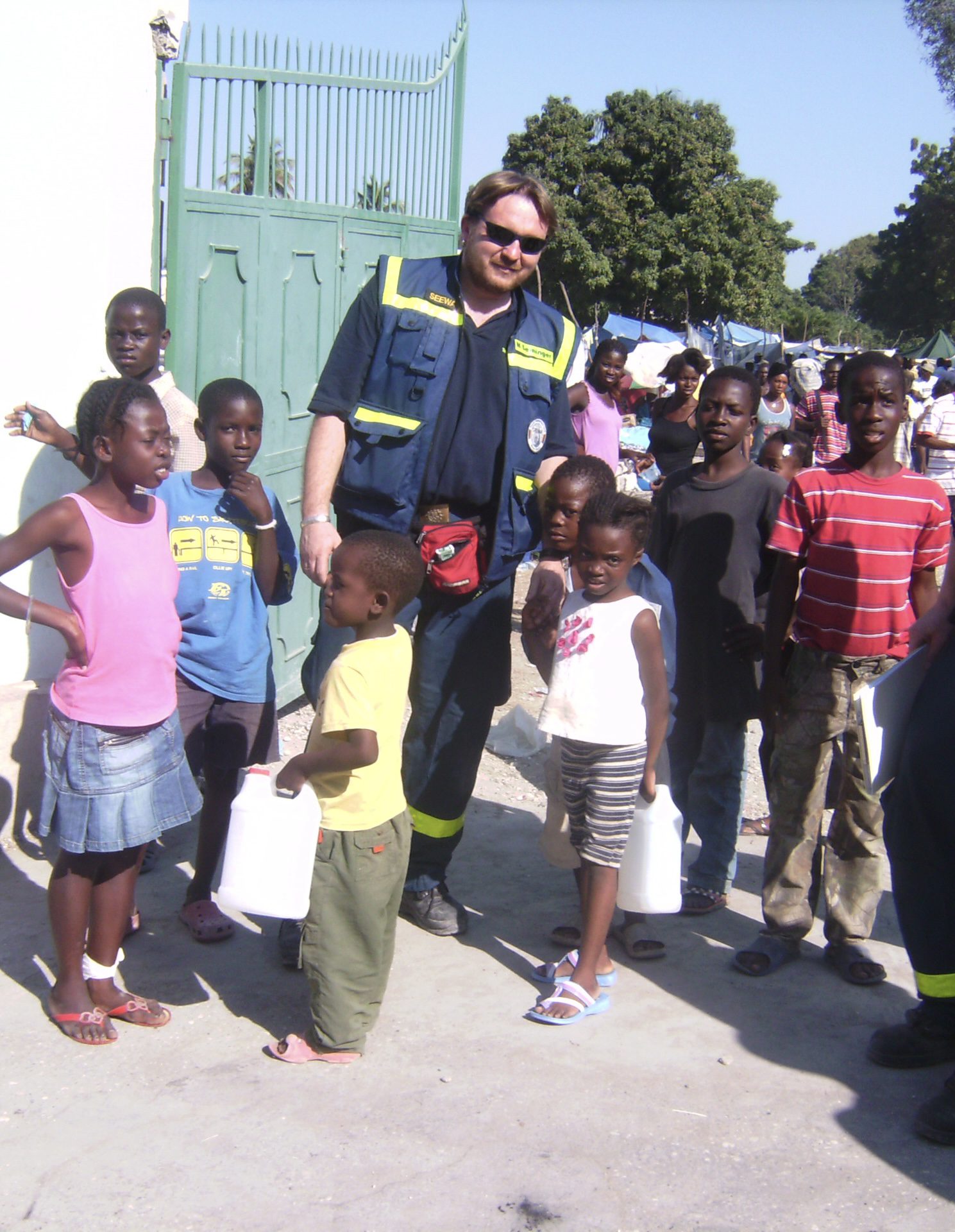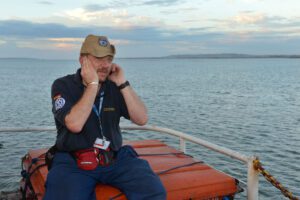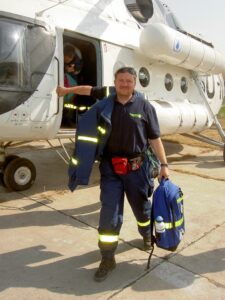Michael Deininger ist Wassermeister. Sieht man im Internet nach, was dieser Beruf bedeutet, bekommt man folgende Information: Der Wassermeister ist ein Beruf der Wasserversorgung. Wassermeister:innen sind beim Wasserwerk oder einem Wasserversorgungsunternehmen angestellt. Hier kümmern sie sich um unser Trinkwasser.
Das ist natürlich auch das, was Herr Deininger während seiner Ausbildung gelernt hat. Er hat aber noch einen viel wichtigeren Satz von seinem Ausbilder mitbekommen. „Wir als Wassermeister:innen können so viel bewegen und zum Positiven verändern!“ Diese Aussage hat der in Dießen Arbeitende verinnerlicht, und da es für ihn schon immer selbstverständlich war, mit seiner Expertise dort zu helfen, wo er helfen kann, war auch klar, dass seine Arbeit weit über die lokale Trinkwasserversorgung hinausgehen wird.
In diesem Jahr wird er daher im Juli mit der Artemed Stiftung nach Tansania in unser Partnerkrankenhaus in Nyangao fahren und sich die Trinkwassersituation dort vor Ort ansehen. Warum es niemand besseren gäbe, der sich dafür qualifiziert, erfahren Sie im Interview, mit dieser außergewöhnlichen Persönlichkeit.
AS (Artemed Stiftung): Herr Deininger, wir freuen uns sehr, dass wir heute mit Ihnen ins Gespräch kommen. In ein paar Monaten werden Sie für uns nach Nyangao fahren, um sich dort mit der Problematik der Wasserversorgung auseinanderzusetzten. Erzählen Sie uns doch ein bisschen davon, was Sie dort erwartet und was Ihre Aufgaben sein werden.
MD (Michael Deininger): Richtig, im Juli ist es soweit. Da werde ich für eine gute Woche zum St. Walburg‘s Hospital fahren. Laut Information sind die Probleme dort zweierlei: Zum einen wird das Wasser von der Bevölkerung häufig nicht mit der notwendigen Sorgfalt verwendet, gibt es Probleme mit rostigem OP-Besteck, dies kann mit Eisen und Mangan im Wasser zusammenhängen.
AS: Es wird nicht sorgfältig verwendet? Wie kann das sein, wenn es doch auf der anderen Seite an Wasser mit guter Qualität mangelt?
MD: Das hört sich in der Tat zunächst widersprüchlich an. Aber es gibt dort keine Wasserzähler, die erfassen, wie viel Wasser verwendet wird und noch schlimmer: Es kostet nichts! Es gibt hier also keinen Anreiz Wasser zu sparen.
AS: Das stimmt natürlich. Was wird nun Ihre Aufgabe dort sein?
MD: Ich werde mir zunächst mal ein Bild von der Situation machen und mir überlegen, wie man die Probleme in den Griff bekommt – idealerweise durch Lösungen vor Ort. Naheliegend wäre zum Beispiel der Einbau von Wasserzählern.
AS: Nehmen Sie dafür schon Zähler mit?
MD: Nein, sicher nicht. Und bei diesem kurzen ersten Aufenthalt werde ich auch keine einbauen. Vielmehr schaue ich, wo man die geeigneten Sachen in der Region beziehen kann. Bei einem zweiten Aufenthalt, kann ich mich dann um die Umsetzung der Maßnahmen kümmern. Das gilt auch für die Wasserqualität in den Wassertanks der Klinik. So kenne ich das auch von früheren Einsätzen: Es gibt ein Erkundungsteam, das schnell kommt, die Lage sondiert und dann Handlungsoptionen für das nachfolgende „Team 2“ ausspricht.
AS: Das hört sich sinnvoll an und bringt mich zum nächsten Punkt, Ihre früheren Einsätze.
MD: Da gibt es tatsächlich eine ganze Reihe, auf fast jedem Kontinent unserer Erde. Sehr viel war ich mit dem THW (technisches Hilfswerk) unterwegs, aber auch mit anderen GOs (Governmental Organisations, Einrichtungen der Regierung) und NGOs (Non-Governmental Osrganisations, Nichregierungsorganisationen).
AS: Dann waren Sie auch oft in Krisengebieten unterwegs und haben im Laufe der Zeit mit Sicherheit viel erlebt und auch einiges gesehen.
MD: Das kann man wohl so sagen: Ich war meistens in „Team 1“ eingeteilt. Da kommt man direkt in die Katastrophe. So zum Beispiel nach dem Tsunami 2004 in Indonesien oder dem schlimmen Erdbeben in Haiti 2010. Was ich hier miterlebt habe und erfahren musste, war sehr großes Leid und Elend.
AS: Vermutlich unvorstellbar… Wie läuft denn dann so ein Einsatz ab?
MD: Das Telefon klingelt – teilweise mitten in der Nacht. Dann heißt es aufstehen, Sachen packen und ein paar Stunden später sitzt man im Flieger, ohne zu wissen was einen erwartet.
AS: Ist das nicht eine enorme Belastung und auch gefährlich? Für Sie selber aber auch für Ihre Familie?
MD: Meine Frau stärkt mir hier zum Glück den Rücken. Allerdings habe ich mir oft gedacht, dass es gut ist, dass sie nicht genau weiß, wie gefährlich es wirklich ist. Meine Kinder haben früher schon manchmal gefragt, als es mehrere Einsätze kurz hintereinander gab, ob ich jetzt mal zuhause bleibe. Inzwischen sind sie groß und selber sozial engagiert.
Und ja: Teilweise ist es für mich auch sehr belastend. Körperlich wie natürlich auch mental. Man bekommt mit der Zeit ein wenig Routine – so sind zum Beispiel meine Sachen inzwischen innerhalb von ein paar Minuten gepackt – aber es ist jedes Mal wieder etwas Neues. Ich bin schon froh, wenn ich heil wieder nachhause komme.
AS: Herr Deininger, es ist wirklich außergewöhnlich, was Sie leisten und Ihr eigenes Leben riskieren. Am liebsten würde man noch stundenlang von Ihren Geschichten hören. Wir sind sehr froh, dass Sie nun auch der Artemed Stiftung mit Ihrer unglaublichen Erfahrung helfen werden. Wir können versichern, der Einsatz wird nicht so gefährlich.
MD: Danke, dass hoffe ich auch! Und ich freue mich sehr, meine Expertise in Nyangao einsetzten zu dürfen.
AS: Wir wünschen Ihnen viel Erfolg in Tansania und warten gespannt auf Ihre Erzählungen im Anschluss. Besten Dank für das Interview.
Ein weiteres spannendes Interview mit Michael Deininger finden Sie unter „Wir sind keine Helden, wir wollen einfach helfen.“ – WIT-Interview mit Michael Deininger, technischer Leiter des Wasserwerks Dießen am Ammersee und ehrenamtlicher Lebensretter – Wasser-Info-Team Bayern e.V. (wasser-bayern.de)





